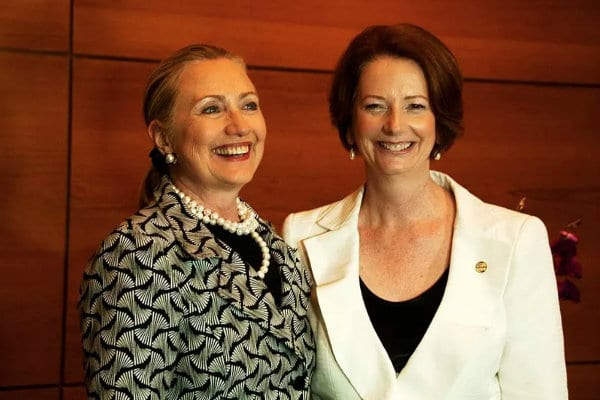That’s the sentence Julia Gillard uttered in her famously astute and dignified final speech as Prime Minister, in reference to having been the first female leader of Australia.
Being a woman wasn’t everything but nor was it nothing and Gillard says the same can be said of Hillary Clinton.
“I think there are many lessons coming out of the Trump/Clinton context and, because the whole campaign was not about gender, the lessons are about more than gender,” Gillard told Fairfax Media.
The world's most powerful women "all had some complaints over the washbasin" when they got together, says Julia Gillard https://t.co/kJvAoF0lUb | @fergushunter
— The Sydney Morning Herald (@smh) January 27, 2018
Clinton and Gillard forged a friendship many years ago and their experiences as women in positions of power are similar. Uncannily similar, Gillard concluded after reading Clinton’s book about the presidential campaign.
Both were subject to rampant sexism, vile abuse and unadulterated misogyny, and both are now openly talking about it. So it is unsurprising that Gillard and Clinton have announced they are joining forces to challenge negative stereotypes of females who aspire to be political leaders and to encourage more women to run.
Both have spoken and written about the research Sheryl Sandberg relied upon in her bestselling Lean In that illustrates the bind female leaders face.
“If we’re too tough, we’re unlikable. If we’re too soft, we’re not cut out for the big leagues,” Clinton wrote. “If we work too hard, we’re neglecting our families. If we put family first, we’re not serious about work. If we have a career but no children, there’s something wrong with us… if we want to compete for higher office, we’re too ambitious.”
Continuing her advocacy for women and girls globally, @JuliaGillard is joining forces with @HillaryClinton to examine the treatment of women in leadership. Brilliant initiative https://t.co/wyZP7kiulb
— EMILY's List Aus (@EMILYsListAus) January 27, 2018
Clinton and Gillard want to work together to change the enduring perception of female leaders as unlikeable, selfish and ruthless.
“There’s plenty of research now that people tend to correlate likeability and leadership in men, but tend to think of female leaders as pretty hard-boiled, and must’ve scratched and clawed to get there … and so they’re not very nice,” Gillard told Fairfax Media. “That certainly played out hard against Hillary.
In her book Clinton described misogyny as “what happens when a woman gets a job that a man wanted, and instead of shaking her hand and wishing her well, he calls her a bitch and vows to do everything he can to make sure she fails”.
In an interview with Fairfax Media Gillard expressed optimism that changing this is achievable.
“I’m hopeful there are some things we can do together in the future on these questions of leadership and gender, bringing to that possibility some of our shared experiences,” Gillard said.
During her Prime Ministership and the majority of her political career, this isn’t subject matter Gillard would have openly explored. She has said that she had hoped if she put her head down and worked hard, her gender would be moot. It wasn’t. Nor is it for any female or male in any setting. Leadership aside.
Gender is omni-present and it throws up a variety of different dynamics. Until recently these dynamics for women in power remained hidden from view. In an interview with BBC radio over the weekend Gillard admitted that female world leaders would often vent or exchange war stories in the bathroom at large meetings.
“You would, I mean, often on a trek to the bathroom, or at the hand basins in the bathroom, talk to each other and have a wry smile about some of the ridiculous things that get written about you,” Gillard said.
World's most powerful women often gather in bathrooms at global events to "vent", says Julia Gillard. https://t.co/bzAtsdPOE8 pic.twitter.com/ZLCZmKFzNx
— The Age (@theage) January 27, 2018
Gillard says getting individuals to scrutinise why they think the way they do, particularly about women in power, is one way to move the dial in this realm. The coming together of women online is a potentially effective catalyst for change too.
“The flashpoint that the internet can provide of bringing people together and empowering the next woman and the next woman to speak up is a truly astonishing thing,” she said.
Fighting against the stereotypes that limit female leaders is a noble pursuit. It’s a cause with many champions and Gillard and Clinton are among them. The question is, given the torrent of misogyny they both faced is it fanciful to believe there is enough willingness to change perceptions? I live in hope.


